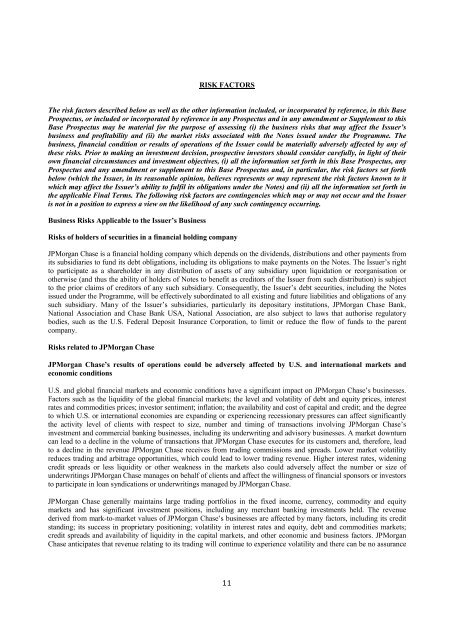JPMORGAN CHASE & CO. - Irish Stock Exchange
JPMORGAN CHASE & CO. - Irish Stock Exchange
JPMORGAN CHASE & CO. - Irish Stock Exchange
Create successful ePaper yourself
Turn your PDF publications into a flip-book with our unique Google optimized e-Paper software.
RISK FACTORS<br />
The risk factors described below as well as the other information included, or incorporated by reference, in this Base<br />
Prospectus, or included or incorporated by reference in any Prospectus and in any amendment or Supplement to this<br />
Base Prospectus may be material for the purpose of assessing (i) the business risks that may affect the Issuer’s<br />
business and profitability and (ii) the market risks associated with the Notes issued under the Programme. The<br />
business, financial condition or results of operations of the Issuer could be materially adversely affected by any of<br />
these risks. Prior to making an investment decision, prospective investors should consider carefully, in light of their<br />
own financial circumstances and investment objectives, (i) all the information set forth in this Base Prospectus, any<br />
Prospectus and any amendment or supplement to this Base Prospectus and, in particular, the risk factors set forth<br />
below (which the Issuer, in its reasonable opinion, believes represents or may represent the risk factors known to it<br />
which may affect the Issuer’s ability to fulfil its obligations under the Notes) and (ii) all the information set forth in<br />
the applicable Final Terms. The following risk factors are contingencies which may or may not occur and the Issuer<br />
is not in a position to express a view on the likelihood of any such contingency occurring.<br />
Business Risks Applicable to the Issuer’s Business<br />
Risks of holders of securities in a financial holding company<br />
JPMorgan Chase is a financial holding company which depends on the dividends, distributions and other payments from<br />
its subsidiaries to fund its debt obligations, including its obligations to make payments on the Notes. The Issuer’s right<br />
to participate as a shareholder in any distribution of assets of any subsidiary upon liquidation or reorganisation or<br />
otherwise (and thus the ability of holders of Notes to benefit as creditors of the Issuer from such distribution) is subject<br />
to the prior claims of creditors of any such subsidiary. Consequently, the Issuer’s debt securities, including the Notes<br />
issued under the Programme, will be effectively subordinated to all existing and future liabilities and obligations of any<br />
such subsidiary. Many of the Issuer’s subsidiaries, particularly its depositary institutions, JPMorgan Chase Bank,<br />
National Association and Chase Bank USA, National Association, are also subject to laws that authorise regulatory<br />
bodies, such as the U.S. Federal Deposit Insurance Corporation, to limit or reduce the flow of funds to the parent<br />
company.<br />
Risks related to JPMorgan Chase<br />
JPMorgan Chase’s results of operations could be adversely affected by U.S. and international markets and<br />
economic conditions<br />
U.S. and global financial markets and economic conditions have a significant impact on JPMorgan Chase’s businesses.<br />
Factors such as the liquidity of the global financial markets; the level and volatility of debt and equity prices, interest<br />
rates and commodities prices; investor sentiment; inflation; the availability and cost of capital and credit; and the degree<br />
to which U.S. or international economies are expanding or experiencing recessionary pressures can affect significantly<br />
the activity level of clients with respect to size, number and timing of transactions involving JPMorgan Chase’s<br />
investment and commercial banking businesses, including its underwriting and advisory businesses. A market downturn<br />
can lead to a decline in the volume of transactions that JPMorgan Chase executes for its customers and, therefore, lead<br />
to a decline in the revenue JPMorgan Chase receives from trading commissions and spreads. Lower market volatility<br />
reduces trading and arbitrage opportunities, which could lead to lower trading revenue. Higher interest rates, widening<br />
credit spreads or less liquidity or other weakness in the markets also could adversely affect the number or size of<br />
underwritings JPMorgan Chase manages on behalf of clients and affect the willingness of financial sponsors or investors<br />
to participate in loan syndications or underwritings managed by JPMorgan Chase.<br />
JPMorgan Chase generally maintains large trading portfolios in the fixed income, currency, commodity and equity<br />
markets and has significant investment positions, including any merchant banking investments held. The revenue<br />
derived from mark-to-market values of JPMorgan Chase’s businesses are affected by many factors, including its credit<br />
standing; its success in proprietary positioning; volatility in interest rates and equity, debt and commodities markets;<br />
credit spreads and availability of liquidity in the capital markets, and other economic and business factors. JPMorgan<br />
Chase anticipates that revenue relating to its trading will continue to experience volatility and there can be no assurance<br />
11
















